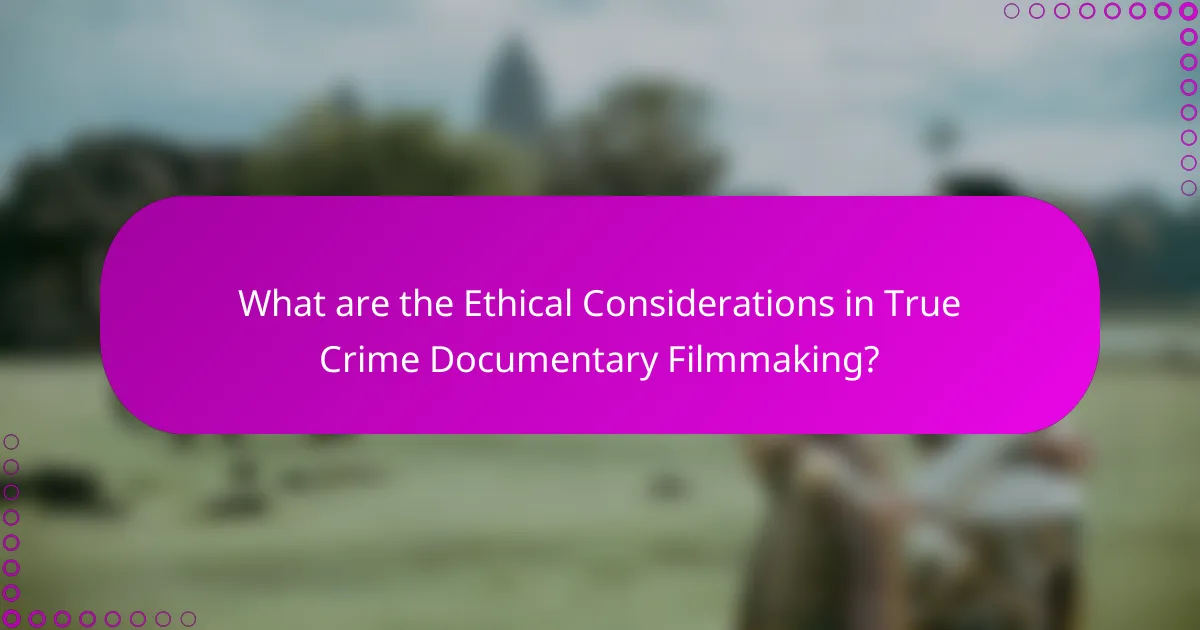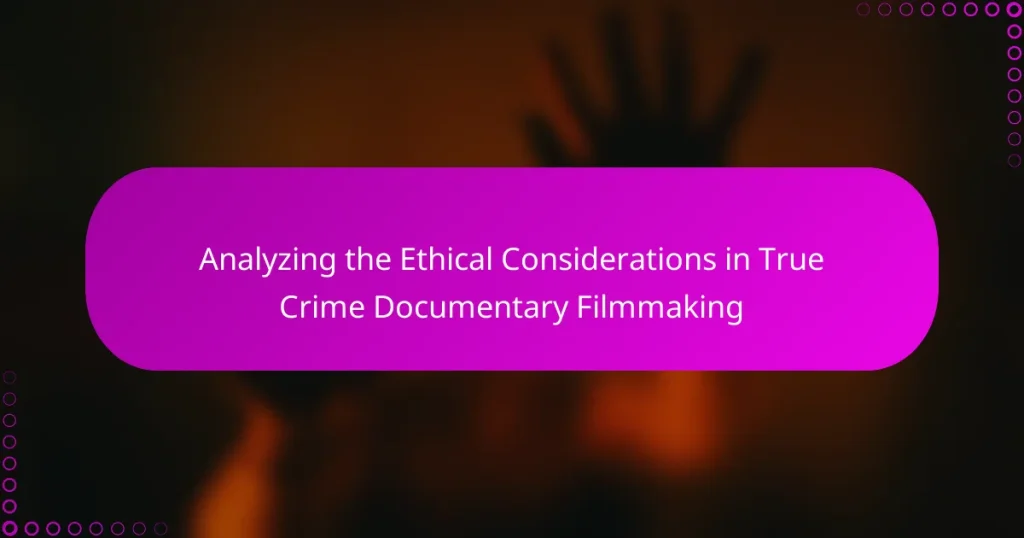The article analyzes the ethical considerations in true crime documentary filmmaking, focusing on the importance of respecting victims and their families. It outlines best practices for filmmakers, emphasizing the need for accurate representation of facts, informed consent from participants, and sensitivity to the emotional impact on viewers. Ethical guidelines are discussed, highlighting the necessity of avoiding sensationalism and ensuring dignity in storytelling. The article also addresses the role of transparency and expert engagement in maintaining integrity and public trust within the true crime genre.

What are the Ethical Considerations in True Crime Documentary Filmmaking?
Ethical considerations in true crime documentary filmmaking include respect for victims and their families. Filmmakers must avoid sensationalizing tragedies. They should ensure accurate representation of facts. Consent from participants is critical, especially from those directly affected. Privacy concerns must be addressed to protect individuals involved. Sensitivity to the emotional impact on viewers is also essential. Ethical guidelines encourage responsible storytelling that prioritizes dignity and respect. These considerations help maintain integrity in documentary filmmaking.
Why is ethics important in true crime documentaries?
Ethics is crucial in true crime documentaries to ensure responsible storytelling. These films often involve real victims and sensitive subjects. Ethical considerations help prevent exploitation of individuals’ trauma. They promote accuracy and fairness in representation. Ethical practices maintain the dignity of those affected by crime. They also foster trust between filmmakers and audiences. Ethical guidelines can enhance the credibility of the documentary. Adhering to ethics can lead to more thoughtful and impactful narratives.
What ethical dilemmas do filmmakers face in this genre?
Filmmakers in the true crime documentary genre face several ethical dilemmas. These dilemmas include the potential for exploitation of victims and their families. Filmmakers must balance storytelling with sensitivity towards those affected by crime. They also grapple with issues of accuracy and representation. Misrepresentation can harm reputations and perpetuate stereotypes. Additionally, filmmakers may face challenges related to consent, especially when involving sensitive topics. The portrayal of real-life events can lead to legal repercussions if not handled carefully. Ethical considerations are crucial to maintain credibility and respect for all parties involved.
How do ethical considerations impact audience perception?
Ethical considerations significantly shape audience perception in true crime documentaries. These considerations influence how viewers interpret the content and the intentions behind it. When filmmakers prioritize ethics, they build trust with the audience. Trust enhances viewer engagement and emotional connection. Conversely, neglecting ethical standards can lead to skepticism and criticism. For instance, documentaries that exploit victims may evoke negative reactions. Research shows that ethical storytelling fosters empathy and understanding among viewers. Therefore, ethical considerations are crucial for shaping a positive audience perception.
What are the key ethical principles in documentary filmmaking?
The key ethical principles in documentary filmmaking include honesty, integrity, and respect for subjects. Honesty involves presenting facts accurately without distortion. Integrity requires filmmakers to avoid manipulation of footage or narratives. Respect for subjects means considering their dignity and privacy. These principles ensure that documentaries maintain credibility and foster trust with audiences. Ethical guidelines, such as those from the International Documentary Association, emphasize these values. Adhering to these principles helps prevent exploitation and misrepresentation in documentary storytelling.
How does informed consent play a role in true crime documentaries?
Informed consent is crucial in true crime documentaries as it ensures that participants agree to their involvement. Filmmakers must obtain permission from individuals featured in the documentary. This includes those directly involved in the crime or its aftermath. Consent protects the rights and privacy of participants. It also builds trust between filmmakers and subjects. Ethical guidelines often mandate that informed consent be documented. This helps prevent exploitation and misrepresentation of individuals’ stories. Failure to secure informed consent can lead to legal repercussions and ethical dilemmas. Thus, informed consent is foundational in maintaining integrity in true crime storytelling.
What responsibilities do filmmakers have towards victims and their families?
Filmmakers have a responsibility to portray victims and their families with respect and sensitivity. They must ensure accurate representation of events and avoid sensationalism. Filmmakers should seek consent from victims’ families when using personal stories. They must also consider the emotional impact on families when depicting traumatic events. Ethical guidelines suggest minimizing harm and prioritizing the dignity of individuals involved. Filmmakers are accountable for the narratives they create, which can influence public perception. This responsibility is crucial in maintaining trust and integrity in storytelling.

How do True Crime Documentaries Navigate Ethical Challenges?
True crime documentaries navigate ethical challenges by prioritizing sensitivity towards victims and their families. Filmmakers often seek consent from those portrayed in their narratives. They aim to present facts accurately without sensationalizing tragedies. Ethical guidelines encourage a balanced portrayal of events, ensuring that the stories do not exploit individuals. Many documentaries include disclaimers about the dramatization of certain elements. They also strive to avoid presenting biased viewpoints, focusing instead on comprehensive storytelling. According to a study by the University of Southern California, ethical considerations are crucial in maintaining public trust and credibility in true crime narratives.
What strategies do filmmakers employ to address ethical concerns?
Filmmakers employ various strategies to address ethical concerns in true crime documentaries. They prioritize informed consent from participants. This ensures individuals understand their involvement and the potential impact of their stories. Filmmakers also implement sensitivity to the subject matter. They avoid sensationalism and respect the dignity of victims and their families. Additionally, they engage in thorough research to present accurate representations of events. This minimizes misrepresentation and fosters trust with the audience. Collaboration with ethical review boards is another strategy. These boards provide guidance on ethical practices and help filmmakers navigate complex moral dilemmas. Lastly, filmmakers often include disclaimers to clarify their intentions and the limitations of their narratives. This transparency helps audiences critically engage with the content.
How can filmmakers balance storytelling with ethical integrity?
Filmmakers can balance storytelling with ethical integrity by prioritizing accuracy and respect for subjects. They should conduct thorough research to ensure factual representation. This involves verifying information from multiple credible sources. Filmmakers must also consider the impact of their narratives on real people. Ethical storytelling requires sensitivity to the experiences of those involved. Additionally, obtaining consent from participants is crucial. Transparency about the filmmaking process fosters trust with audiences. Following ethical guidelines set by industry organizations can further enhance integrity. These practices collectively contribute to responsible and impactful storytelling.
What role does transparency play in ethical filmmaking?
Transparency is crucial in ethical filmmaking as it fosters trust between filmmakers and audiences. It ensures that the production processes, intentions, and sources are clear. This openness can prevent misinformation and manipulation of narratives. Ethical filmmakers often disclose their methods and the context behind their storytelling. For instance, revealing the perspectives of subjects can enhance authenticity. Studies show that transparency can lead to greater audience engagement and understanding. Moreover, it helps uphold the integrity of the documentary genre, particularly in sensitive topics like true crime. By being transparent, filmmakers honor their subjects and the viewing public.
What are the consequences of ignoring ethical considerations?
Ignoring ethical considerations in true crime documentary filmmaking can lead to significant negative consequences. These consequences include the potential for misinformation, which can mislead audiences. Filmmakers may exploit victims or their families for entertainment, causing emotional harm. There is also a risk of legal repercussions, such as lawsuits for defamation or invasion of privacy. Additionally, ignoring ethics can damage the filmmaker’s reputation and credibility. Research shows that ethical lapses can result in public backlash and loss of viewership. Audiences increasingly demand responsible storytelling, making ethical considerations essential for success.
How can unethical practices affect the documentary’s credibility?
Unethical practices can severely undermine a documentary’s credibility. When filmmakers manipulate facts or misrepresent subjects, trust erodes among viewers. For instance, deceptive editing can create false narratives. This leads audiences to question the authenticity of the documentary. Research shows that documentaries perceived as biased or dishonest receive lower ratings. A study by the University of Southern California found that ethical lapses directly correlate with viewer skepticism. Thus, maintaining ethical standards is crucial for preserving credibility in documentary filmmaking.
What are the potential legal ramifications for filmmakers?
Filmmakers can face various legal ramifications, including copyright infringement, defamation, and invasion of privacy. Copyright infringement occurs when filmmakers use protected material without permission. Defamation may arise if a film portrays individuals in a false light or makes untrue statements that harm their reputation. Invasion of privacy can happen if filmmakers reveal private facts about individuals without consent. Legal cases, such as the 2016 case involving the documentary “The Act of Killing,” illustrate these risks. Filmmakers must navigate these legal challenges to avoid lawsuits and financial penalties.

What Are the Best Practices for Ethical True Crime Documentary Filmmaking?
Best practices for ethical true crime documentary filmmaking include prioritizing the dignity of victims and their families. Filmmakers should obtain informed consent from participants. Transparency about the intentions and processes is essential. They must avoid sensationalism and respect the emotional impact of the subject matter. Engaging with experts can provide context and accuracy. Additionally, filmmakers should consider the potential consequences of their work on the community. Ethical guidelines from organizations like the International Documentary Association support these practices. Following these principles fosters trust and integrity in storytelling.
How can filmmakers ensure ethical storytelling?
Filmmakers can ensure ethical storytelling by prioritizing honesty, sensitivity, and respect for subjects. They should conduct thorough research to present accurate narratives. Engaging with subjects and communities fosters trust and understanding. Filmmakers must obtain informed consent from participants. Transparency about intentions and processes is crucial. Ethical guidelines, such as those from the International Documentary Association, provide frameworks for responsible practices. By adhering to these principles, filmmakers can create compelling stories that honor their subjects and audiences.
What guidelines should be followed for respectful representation of subjects?
Respectful representation of subjects in true crime documentaries requires adherence to ethical guidelines. Filmmakers should prioritize the dignity and humanity of individuals involved. This includes obtaining informed consent from subjects or their families. Transparency about the documentary’s purpose and content is essential. Filmmakers must avoid sensationalism and exploitative narratives. Accurate portrayal of events and context is crucial to avoid misrepresentation. Sensitivity to the emotional impact on subjects and their families should guide storytelling choices. These guidelines promote ethical filmmaking and foster trust with audiences and subjects.
How can filmmakers engage with communities affected by crime?
Filmmakers can engage with communities affected by crime by fostering open dialogue and collaboration. They should conduct community meetings to understand local perspectives. Filmmakers can involve community members in the storytelling process. This inclusion helps ensure authentic representation of experiences. Providing platforms for local voices can build trust. Filmmakers may also offer educational workshops on media literacy. This empowers communities to critically engage with their portrayal in media. Collaborating with local organizations can enhance outreach efforts. Such partnerships can facilitate access to resources and support for affected individuals.
What resources are available for filmmakers to improve ethical practices?
Filmmakers can access various resources to enhance ethical practices. Organizations like the International Documentary Association provide guidelines on ethical storytelling. The Documentary Ethics Project offers a framework for ethical decision-making in documentary filmmaking. Online courses from platforms such as Coursera and MasterClass focus on ethical considerations in film production. Books like “Documentary Storytelling” by Sheila Curran Bernard discuss ethics in narrative construction. Additionally, industry conferences often feature panels on ethical filmmaking practices. These resources equip filmmakers with knowledge and tools to navigate ethical challenges effectively.
Where can filmmakers find ethical guidelines and frameworks?
Filmmakers can find ethical guidelines and frameworks through various industry organizations and resources. The International Documentary Association (IDA) provides ethical guidelines specifically for documentary filmmakers. The Association of Independent Commercial Producers (AICP) also offers resources focused on ethical practices in production. Additionally, academic institutions often publish research papers and articles on ethics in filmmaking. The “Filmmaker’s Code of Ethics” by the National Press Photographers Association (NPPA) serves as a valuable reference. These sources collectively help filmmakers navigate ethical considerations in their work.
How can filmmakers participate in discussions about ethics in documentary filmmaking?
Filmmakers can participate in discussions about ethics in documentary filmmaking by engaging in forums and panels focused on ethical practices. They can share their experiences and challenges related to ethical dilemmas. Filmmakers can also contribute to academic journals and publications that explore ethical considerations. By collaborating with ethicists and scholars, they can gain insights into best practices. Documentaries often impact real lives, making ethical discussions crucial for responsible storytelling. Filmmakers should actively seek feedback from their subjects and communities affected by their work. Participating in workshops and training sessions on ethics can further enhance their understanding. Ultimately, open dialogue within the industry fosters a culture of ethical awareness and accountability.
What are some common pitfalls to avoid in true crime documentary filmmaking?
Common pitfalls to avoid in true crime documentary filmmaking include sensationalism, lack of sensitivity, and factual inaccuracies. Sensationalism can distort the narrative and undermine the seriousness of the subject. Lack of sensitivity towards victims and their families can lead to ethical breaches. Factual inaccuracies can misinform the audience and damage credibility. Additionally, failing to provide proper context may result in misunderstandings about the events portrayed. Ignoring legal considerations can also lead to potential lawsuits. Lastly, neglecting to balance perspectives can create biased narratives. Each of these pitfalls can significantly impact the integrity and reception of the documentary.
How can filmmakers prevent sensationalism in their work?
Filmmakers can prevent sensationalism in their work by prioritizing factual accuracy and ethical storytelling. This involves thorough research to ensure that all claims are substantiated. Filmmakers should focus on presenting the subject matter with sensitivity and respect for those affected. They can avoid exaggeration of events or emotions that could mislead viewers. Engaging with experts and individuals directly involved can provide authentic perspectives. Additionally, filmmakers should be transparent about their intentions and the limitations of their narratives. Maintaining a commitment to integrity fosters trust with the audience. Studies show that documentaries grounded in truth and ethical practices lead to more impactful storytelling.
What should filmmakers consider when portraying real-life events and individuals?
Filmmakers should consider accuracy, sensitivity, and ethical implications when portraying real-life events and individuals. Accuracy ensures that the representation of events is truthful and respects the historical context. Sensitivity is crucial in handling subjects that may involve trauma or loss. Filmmakers must also consider the potential impact on individuals depicted, including their privacy and emotional well-being. Ethical implications involve the responsibility to avoid sensationalism and to represent individuals fairly. For instance, the portrayal of victims should honor their experiences without exploiting their stories for entertainment. These considerations help maintain integrity and respect in documentary filmmaking.
The main entity of the article is true crime documentary filmmaking, which explores the ethical considerations involved in this genre. Key topics include the importance of ethical storytelling, the responsibilities filmmakers have towards victims and their families, and the impact of ethics on audience perception. The article discusses ethical dilemmas filmmakers face, such as consent and representation, and outlines best practices for maintaining integrity in documentary production. Additionally, it highlights resources available for filmmakers to enhance their ethical practices and emphasizes the consequences of ignoring ethical standards.


